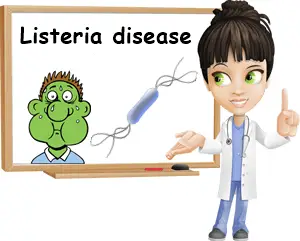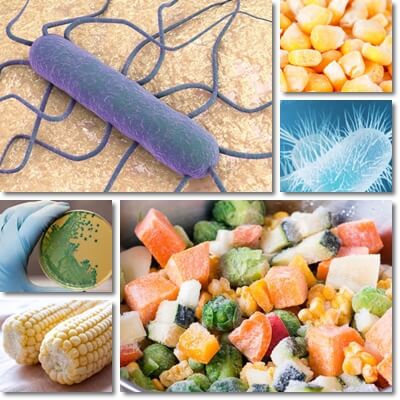In light of the recent multi-country food-borne illness outbreak in Europe, caused by consumption of frozen food produce contaminated with the bacteria Listeria, there is some level of panic among the general population. People are looking to understand what is Listeria, what kind of illness it produces and how severe it is as well as how to prevent a Listeria infection, foods to avoid and other pro-health measures they can take in order to better protect themselves and their families from the food-related illness. About the current Listeria outbreak, here is what to know and what to do:
Fact 1: The 2018 Listeria outbreak is caused by contaminated frozen corn and possibly other frozen vegetable packages. The source of the infection has been traced back to a Hungarian food processing company that has been distributing frozen produce all over Europe. Affected countries include Austria, Denmark, Finland, Sweden and the UK. As of July 2018, there are close to 50 reported infections and 9 casualties. More cases are expected to emerge because of the potentially high incubation period of Listeria bacteria.

Fact 2: The 2018 Listeria outbreak in Europe is caused by the strain called Listeria monocytogenes. This particular strain is highly pathogenic and virulent. It is especially dangerous for pregnant women, the elderly, small children and anyone with a compromised or lowered immune system, including AIDS sufferers, people having undergone chemotherapy and radiation treatment as well as anyone with immune system deficiencies and complications related to chronic illnesses such as diabetes or advanced kidney disease.
Fact 3: Contaminated and suspected contaminated products have been recalled. Known contaminated products include frozen corn packages. Frozen vegetable mixes from the same company have also been recalled. Public health and safety authorities recommend people refrain from eating frozen vegetables that are potentially contaminated with the bacteria.
Fact 4: The current Listeria outbreak spans over the course of several years. The first cases related to frozen produce from the same company started back in August 2016 and have continued until June 2018. More cases are expected to be reported in the following months as the infection caused by this particular bacteria can take up to 70 days to produce symptoms. So this recent food outbreak is not actually recent. It would appear that the company where the contamination originated has had difficulty in completely removing the bacteria from the production line, despite disinfection protocols being carried out as soon as they were made aware of the situation.

Fact 5: Listeria is quite a hardy bacteria: it can withstand temperatures as low a 0 degrees Celsius and still continue to produce infection at body temperature and above. This hardiness can explain why, despite disinfection protocols, the bacteria persisted within the frozen food factory. It also explains why Listeria infection is one of the most common foodborne illness, along with Salmonella and Escherichia coli. See E. Coli Infection: Causes, Symptoms and Treatment.
Fact 6: What is listeria disease called? A listeria infection and the disease it causes are called listeriosis. By definition, listeriosis refers to all forms of disease caused by infection with bacteria in the Listeria genus, the most likely of which is the species Listeria monocytogenes. The current wave of infections is caused by the strain called Listeria monocytogenes. Find out more about Listeria Monocytogenes Infection: Causes, Symptoms and Treatment.
Listeriosis is classified as a foodborne illness or food-related illness because it is transmitted as a result of poor hygiene, via contaminated food products, kitchen surfaces and kitchen utensils contaminated from food products.
Fact 7: Symptoms of Listeria may vary from person to person, but the infection generally causes gastroenteritis-like symptoms and flu-like symptoms. Listeria symptoms in adults include:
1) Gastroenteritis symptoms: nausea, vomiting, abdominal cramps, diarrhea, back pain, fever.
2) Influenza symptoms: fatigue, malaise, muscle aches, muscle pain, joint aches and pain, neck pain and stiffness, headaches, confusion, seizures.
Listeria symptoms in newborns include: poor feeding, irritability, fever.
Fact 8: As long as the symptoms are restricted to the gastrointestinal tract, the infection is considered mild and is called non-invasive listeriosis. When the infection has moved onto the blood, brain and central nervous system (neck stiffness and pain, confusion), the infection is known as severe, invasive listeriosis and represents a medical emergency.
Fact 9: Most healthy adults are expected to only develop a self-resolving gastroenteritis as a result of the infection. See Gastroenteritis: Causes, Symptoms and Treatment.
Certain people are more likely to develop complications such as listeria pneumonia, meningitis, encephalitis, meningoencephalitis, endocarditis, brain abscesses. Listeriosis in pregnant women causes miscarriage, stillbirth, possibly long-term health problems for the baby.
Those at risk for complications include: the elderly, small children, pregnant women and newborns as well as anyone with immune system deficiencies (examples: cancer patients having undergone radiation therapy, chemotherapy, HIV and AIDS sufferers, people with chronic illnesses that inadvertently cause lowered immune system).
When to seek medical help?
If you remember eating one of the recalled food products, see your doctor. If you are one of the risks categories and exhibit symptoms of Listeria infection, see your healthcare professional immediately. If you are a healthy adult and experience neck stiffness, neck pain, pain in the back of the head, confusion, lightheadedness or high fever, seek medical help as soon as possible; in light of this recent food outbreak, it is not unlikely you may have contracted the infection. Serious cases of Listeria require antibiotic treatment.
How to prevent Listeria infection and disease
1) Reach out to the public health authorities in your country or region and ask for a list of potentially contaminated food products, if that list hasn’t been made public yet.
2) Avoid purchasing, eating potentially contaminated food products and discard them if you have already bough them.
3) Wash fruits very well, thoroughly cook vegetables and meat (preferably boil them), eat only cheese made from pasteurized milk, cook sausages, hot dogs and similar deli meats.
4) Wash hands well after handling raw meat, fish, milk and dairy (made from unpasteurized milk), fruits and vegetables.
5) Use different cutting boards and kitchen utensils for handling different types of food (raw meat, dairy, fresh fruits, vegetables). Hot water and soap as well as alcohol disinfectants work great.
6) Also disinfect surfaces, cutting boards and kitchen utensils well to prevent the spread of the bacteria.
7) Do not store different foods together (example: do not store fresh fruit with dairy or raw meat with vegetables). Listeria can grow and multiply easily in refrigerator conditions thanks to the cold and humidity as well as transfer from one food to another easily, especially when stored in close proximity.
8) When eating out, inquire about the source of the ingredients used or, better yet, avoid eating the same types of foods as the ones currently being recalled.
9) People at risk for severe forms of the disease and complications should avoid raw and undercooked meat and vegetables, unpasteurized milk and dairy such as soft cheeses (example: Brie, Camembert), sprouts and deli meats or cold meats, smoked meat and fish, all possible foods with Listeria.
Is it still safe to eat frozen vegetables during the listeriosis outbreak?
No, it’s not safe. It is important to closely follow the recommendations of the public health authorities in your country. The public health authorities will identify all the potentially contaminated food sources (example: frozen vegetables, ready to eat or still requiring cooking, canned vegetables, fresh vegetables or fruits), then recall them. Supermarkets and all distributors are required to remove all the suspected contaminated food products from their shelves. If you have suspected contaminated products at home, do not eat them.
Even though cooking for sufficient amounts of time at high enough temperatures destroys bacteria such as Listeria monocytogenes, the main reason why it isn’t safe to eat frozen vegetables during this recent listeriosis outbreak is because illness can still occur as a result of cross-contamination. For example, when you open a bag of contaminated frozen vegetables, your hands will come into contact with the contents of the bag and, implicitly, the bacteria. From there on, the bacteria can easily get transferred to kitchen utensils, surfaces, any object you may touch prior to washing your hands (example: your phone), other food or people. And this increases the risk of infection and disease. Listeria in foods like raw meat can transfer to other foods as well, especially if stored in close proximity.
